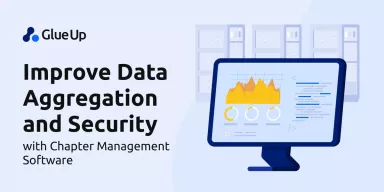
Spreadsheets have been the go-to tool for businesses to manage their data for decades. However, with the rise of more sophisticated systems and the increasing complexity of modern organizations, relying on spreadsheets can actually do more harm than good.
This is especially true for multi-chapter associations, which can benefit greatly from transitioning to more specialized software.
In this article, we’ll discuss the most important reasons why you should stop using spreadsheets and their alternatives for a more streamlined and secure process.
The Problems with Spreadsheets
While spreadsheets are a convenient way to store and manage data, they have several limitations when used for chapter-based organizations, like:
Reason # 1: Limited Collaboration and Visibility
Spreadsheets were not designed for collaboration, which makes it difficult for organizations to keep track of changes made by different departments.
It’s also challenging to organize data across chapters. With each department making edits to the files, data can slip between the cracks with ease. This lack of visibility can lead to miscommunication, errors, and confusion.
Additionally, as your chapters strive to grow with spreadsheets, the files will be bounced from employee to employee. Even the smallest changes can easily lead to multiple versions of the same spreadsheet.
Reason # 2: More Prone to Error
Spreadsheets can be very error-prone, especially when data sets are large and complex.
According to various studies, nearly 9 out of 10 spreadsheets (88%) contain errors.
Simple mistakes like typos, incorrect formulas, or accidentally deleting important data can have serious consequences. Since spreadsheets are often shared and edited by multiple people, it’s easy for errors to be introduced without anyone noticing.
Reason # 3: Limited Scalability
As organizations grow and expand, they often find themselves outgrowing spreadsheets.
Since worksheets are not designed to handle large data sets, and can quickly become slow and unwieldy. As a result, it can be difficult to keep track of all the information, which can lead to errors and inaccuracies.
Reason # 4: They are not Dynamic
Worksheets are designed to be updated manually and require a lot of time and effort to maintain.
This can be especially challenging for multi-tier organizations as they need to manage a lot of data across different chapters. Tasks like data entry, formula creation, and report generation can be time-consuming and error-prone when done manually.
Reason # 5: High-Security Risks
Spreadsheets are shared with almost everyone on a team which can result in sensitive information ending up in the hands of people not authorized to see it.
Additionally, they are shared by email, cloud sharing, or USB, thus making them more susceptible to compromise or unauthorized sharing of sensitive or confidential information.
Reason # 6: Limited Analysis and Reporting
While spreadsheets are useful for organizing data, they are not very good at analyzing it.
For multi-chapter organizations, it’s important to be able to analyze data across different branches and make informed decisions based on that data.
Worksheets do not have the capabilities to generate reports or perform advanced analysis, which can limit your data-driven decision-making.
Reason # 7: Higher Costs in the Long Run
While spreadsheets may seem like a cost-effective solution, they can actually be more expensive in the long run.
As your organizations grow and become more complex, the time and effort required to manage data in spreadsheets can become overwhelming. This can lead to increased staffing costs or the need to hire outside consultants to help manage the data.
So, What’s the Alternative?
Thanks to the slew of new specialized technologies emerging, spreadsheets are no longer the irreplaceable tools they once were.
These contemporary tools are designed to automate many of the manual processes involved in managing chapter activities and member information, including:
- Streamlined data management: They have centralized data management and automation, saving time and reducing the risk of manual error.
- Robust reporting and analytics: They offer more sophisticated reporting and analytics capabilities, allowing chapter-based organizations to gain insights and make data-driven decisions.
- Scalability and flexibility: Unlike spreadsheets, they are easily customized to accommodate evolving data management needs.
Several platforms are available to replace spreadsheets, each with its own set of functionalities. Some are basic CRM software while others have additional features like online registrations, event management, members-only communication tools, and member directories.
We strongly recommend choosing the one that best matches your organizational needs. If you are a large association with chapters, a multi-chapter association management software might be the right fit for you.
Multi-Chapter Association Management Software - An All-Inclusive Solution for Chapter-Based Organizations
Chapter management software has become increasingly popular among nonprofits, trade associations, and other organizations that have multiple chapters or affiliates.
Its cutting-edge technology enables organizations to efficiently manage their operations, streamline communication between members, and improve their overall performance.
This cutting-edge platform has a centralized CRM which is designed to handle large amounts of customer data. This means that all of your data, including member details, financial records, and event details, is accessible from one place.
It also has dynamic smart lists which automatically add your contacts that match certain criteria. Additionally, you can set user access levels to ensure data integrity and security.
You can explore the platform and its robust functionalities by getting a demo here.
Case Study: How ABASA Replaced Spreadsheets to Better Serve Its Members
The Association for the Advancement of Black Accountants of Southern Africa (ABASA) strives to ensure that every aspiring Black accountant is provided with the necessary support to advance in their profession.
The organization's biggest challenge was managing its database, which involved manually updating and consolidating spreadsheets from its 9 branches to keep track of members.
However, with the assistance of Glue Up’s all-in-one software, the team was able to convert their existing contact list of approximately 5000 membership leads into paying members. Additionally, they were able to consolidate the tasks performed by different software, simplifying the user experience and eliminating human error.
—-----------------------------------------------------------------------------------------------------------------------
As your organization continues to grow and evolve, relying on spreadsheets can lead to inefficiencies and errors. Dedicated solutions like chapter management software provide a more efficient and effective way to manage chapter activities and member information.
By adopting modern software tools, you will not only streamline your workflows, but also increase member engagement, and make your goals more attainable.
If you are interested in knowing more about centralizing your data and automating processes, feel free to contact us here. It’s time for you to stop with worksheets and embrace the benefits of going digital!



